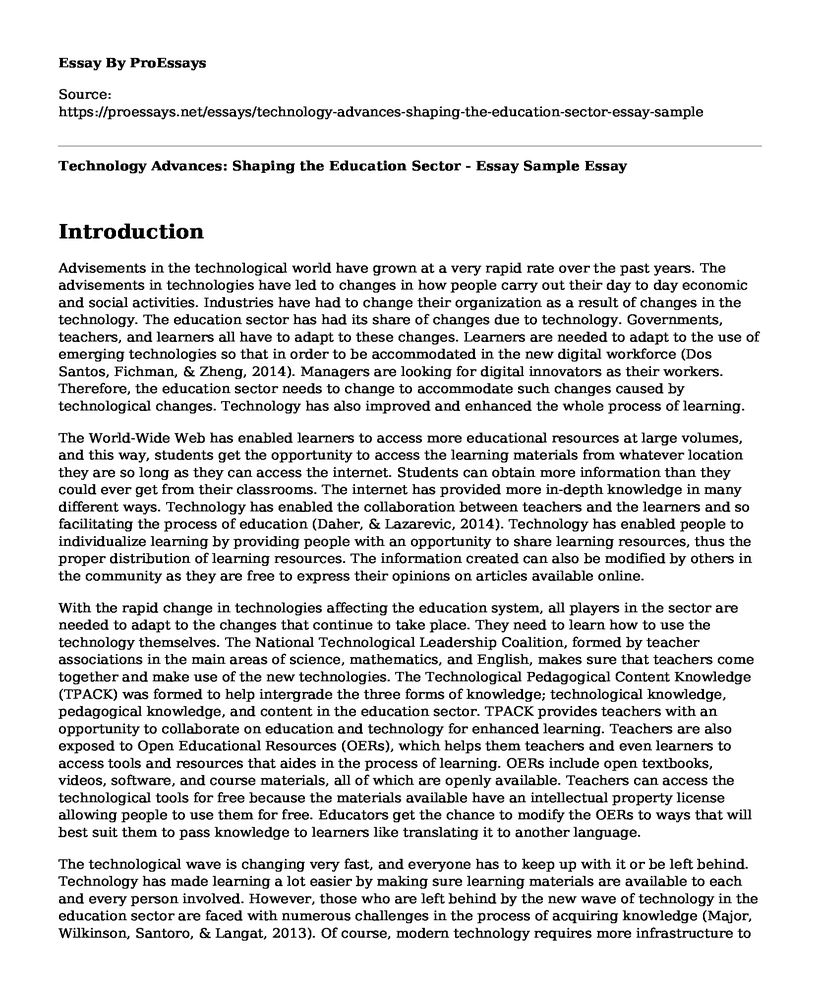Introduction
Advisements in the technological world have grown at a very rapid rate over the past years. The advisements in technologies have led to changes in how people carry out their day to day economic and social activities. Industries have had to change their organization as a result of changes in the technology. The education sector has had its share of changes due to technology. Governments, teachers, and learners all have to adapt to these changes. Learners are needed to adapt to the use of emerging technologies so that in order to be accommodated in the new digital workforce (Dos Santos, Fichman, & Zheng, 2014). Managers are looking for digital innovators as their workers. Therefore, the education sector needs to change to accommodate such changes caused by technological changes. Technology has also improved and enhanced the whole process of learning.
The World-Wide Web has enabled learners to access more educational resources at large volumes, and this way, students get the opportunity to access the learning materials from whatever location they are so long as they can access the internet. Students can obtain more information than they could ever get from their classrooms. The internet has provided more in-depth knowledge in many different ways. Technology has enabled the collaboration between teachers and the learners and so facilitating the process of education (Daher, & Lazarevic, 2014). Technology has enabled people to individualize learning by providing people with an opportunity to share learning resources, thus the proper distribution of learning resources. The information created can also be modified by others in the community as they are free to express their opinions on articles available online.
With the rapid change in technologies affecting the education system, all players in the sector are needed to adapt to the changes that continue to take place. They need to learn how to use the technology themselves. The National Technological Leadership Coalition, formed by teacher associations in the main areas of science, mathematics, and English, makes sure that teachers come together and make use of the new technologies. The Technological Pedagogical Content Knowledge (TPACK) was formed to help intergrade the three forms of knowledge; technological knowledge, pedagogical knowledge, and content in the education sector. TPACK provides teachers with an opportunity to collaborate on education and technology for enhanced learning. Teachers are also exposed to Open Educational Resources (OERs), which helps them teachers and even learners to access tools and resources that aides in the process of learning. OERs include open textbooks, videos, software, and course materials, all of which are openly available. Teachers can access the technological tools for free because the materials available have an intellectual property license allowing people to use them for free. Educators get the chance to modify the OERs to ways that will best suit them to pass knowledge to learners like translating it to another language.
The technological wave is changing very fast, and everyone has to keep up with it or be left behind. Technology has made learning a lot easier by making sure learning materials are available to each and every person involved. However, those who are left behind by the new wave of technology in the education sector are faced with numerous challenges in the process of acquiring knowledge (Major, Wilkinson, Santoro, & Langat, 2013). Of course, modern technology requires more infrastructure to enhance the delivery of information to learners. Whereas the internet has made available a wide range of information to learners, little attention is paid to those with difficulties accessing the data. Due to technology, the usual physical interaction between teachers and the students and among the students alone is reduced due to virtual training programs available in schools. Instructors are now challenged with handling the technical difficulties encountered, and at the same time, they are supposed to continue passing knowledge to their students.
Conclusion
In summary, the advancement in the technology world has raised the need for the education sector to change in order to adapt to changes in the rest of the world due to technology. Technology has improved learning by increasing access to knowledge to both teachers and learners. Programs like TPACK have created the necessary collaboration between teachers in making sure that technology is well integrated into the process of learning. However, there is a need to make sure that enough support is given to everyone in the education sector, including the teachers for enhanced learning.
References
Daher, T. & Lazarevic, B. (2014). Emerging instructional technologies: Exploring the extent of faculty use of web 2.0 tools at a midwestern community college. TechTrends. 58. 42-50. 10.1007/s11528-014-0802-1.
Dos Santos, B., Fichman, R., & Zheng, Z. (2014). Digital Innovation as a Fundamental and Powerful Concept in the Information Systems Curriculum. MIS Quarterly. 38. 329-353. 10.25300/MISQ/2014/38.2.01.
Major, J., Wilkinson, J., Santoro, N., & Langat, K. (2013). Regional and rural Australia as a site of settlement for young African background refugees: A double-edged sword. Australian and International Journal of Rural Education, 23(3), 95-105.
McKerlich, R., Ives, C., & McGreal, R. (2013). Measuring Use and Creation of Open Educational Resources in Higher Education. International Review of Research in Open and Distance Learning. 14. 90-103. 10.19173/irrodl.v14i4.1573.
Cite this page
Technology Advances: Shaping the Education Sector - Essay Sample. (2023, Jun 10). Retrieved from https://proessays.net/essays/technology-advances-shaping-the-education-sector-essay-sample
If you are the original author of this essay and no longer wish to have it published on the ProEssays website, please click below to request its removal:
- PR Writing Reflection: Facebook Inc. Release on Private Data Breach
- Building-Integrated Photovoltaic Research Paper Example
- Robots in the Food Industry Essay Example
- Does Technology Invade Our Privacy? Paper Example
- Global Sustainability and Innovation - Essay Sample
- Middle East: A Boom in Wealth Creation Due to Oil Discovery - Essay Sample
- Essay Example on AI & IoT: Enhancing the Internet Experience







